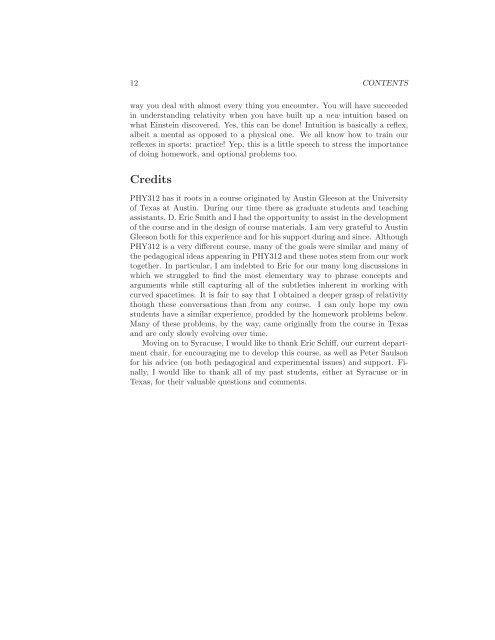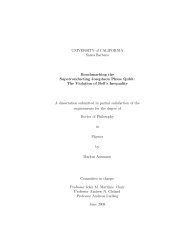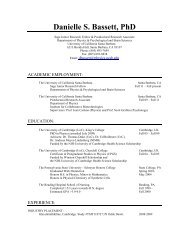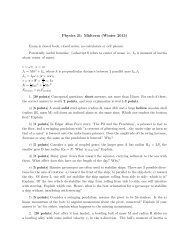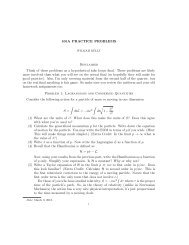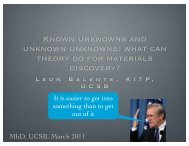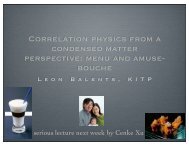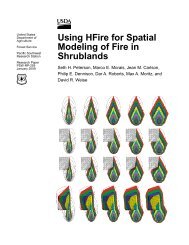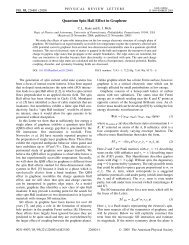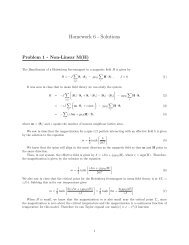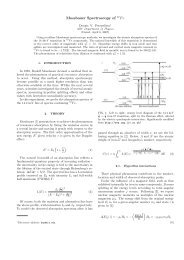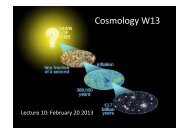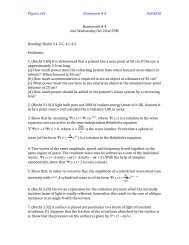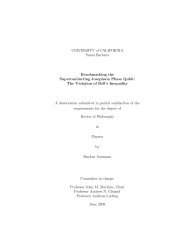- Page 1: Notes on Relativit
- Page 4 and 5: 4 CONTENTS 2.3 Homework Problems .
- Page 6 and 7: 6 CONTENTS 8 General Relativity and
- Page 8 and 9: 8 CONTENTS
- Page 10 and 11: 10 CONTENTS While I have worked to
- Page 14 and 15: 14 CONTENTS but this does not mean
- Page 16 and 17: 16 CONTENTS 0.3 Coursework and Grad
- Page 18 and 19: 18 CONTENTS d) include references t
- Page 20 and 21: 20 CONTENTS However, your challenge
- Page 22 and 23: 22 CONTENTS 0.4 Some Suggestions fo
- Page 24 and 25: 24 CONTENTS Course Calendar The fol
- Page 26 and 27: 26 CHAPTER 1. SPACE, TIME, AND NEWT
- Page 28 and 29: 28 CHAPTER 1. SPACE, TIME, AND NEWT
- Page 30 and 31: 30 CHAPTER 1. SPACE, TIME, AND NEWT
- Page 32 and 33: 32 CHAPTER 1. SPACE, TIME, AND NEWT
- Page 34 and 35: 34 CHAPTER 1. SPACE, TIME, AND NEWT
- Page 36 and 37: 36 CHAPTER 1. SPACE, TIME, AND NEWT
- Page 38 and 39: 38 CHAPTER 1. SPACE, TIME, AND NEWT
- Page 40 and 41: 40 CHAPTER 1. SPACE, TIME, AND NEWT
- Page 42 and 43: 42 CHAPTER 1. SPACE, TIME, AND NEWT
- Page 44 and 45: 44 CHAPTER 2. MAXWELL, E&M, AND THE
- Page 46 and 47: 46 CHAPTER 2. MAXWELL, E&M, AND THE
- Page 48 and 49: 48 CHAPTER 2. MAXWELL, E&M, AND THE
- Page 50 and 51: 50 CHAPTER 2. MAXWELL, E&M, AND THE
- Page 52 and 53: 52 CHAPTER 2. MAXWELL, E&M, AND THE
- Page 54 and 55: 54 CHAPTER 2. MAXWELL, E&M, AND THE
- Page 56 and 57: 56 CHAPTER 3. EINSTEIN AND INERTIAL
- Page 58 and 59: 58 CHAPTER 3. EINSTEIN AND INERTIAL
- Page 60 and 61: 60 CHAPTER 3. EINSTEIN AND INERTIAL
- Page 62 and 63:
62 CHAPTER 3. EINSTEIN AND INERTIAL
- Page 64 and 65:
64 CHAPTER 3. EINSTEIN AND INERTIAL
- Page 66 and 67:
66 CHAPTER 3. EINSTEIN AND INERTIAL
- Page 68 and 69:
68 CHAPTER 3. EINSTEIN AND INERTIAL
- Page 70 and 71:
70 CHAPTER 3. EINSTEIN AND INERTIAL
- Page 72 and 73:
72 CHAPTER 3. EINSTEIN AND INERTIAL
- Page 74 and 75:
74 CHAPTER 3. EINSTEIN AND INERTIAL
- Page 76 and 77:
76 CHAPTER 3. EINSTEIN AND INERTIAL
- Page 78 and 79:
78 CHAPTER 3. EINSTEIN AND INERTIAL
- Page 80 and 81:
80 CHAPTER 3. EINSTEIN AND INERTIAL
- Page 82 and 83:
82 CHAPTER 3. EINSTEIN AND INERTIAL
- Page 84 and 85:
84 CHAPTER 3. EINSTEIN AND INERTIAL
- Page 86 and 87:
86 CHAPTER 4. MINKOWSKIAN GEOMETRY
- Page 88 and 89:
88 CHAPTER 4. MINKOWSKIAN GEOMETRY
- Page 90 and 91:
90 CHAPTER 4. MINKOWSKIAN GEOMETRY
- Page 92 and 93:
92 CHAPTER 4. MINKOWSKIAN GEOMETRY
- Page 94 and 95:
94 CHAPTER 4. MINKOWSKIAN GEOMETRY
- Page 96 and 97:
96 CHAPTER 4. MINKOWSKIAN GEOMETRY
- Page 98 and 99:
98 CHAPTER 4. MINKOWSKIAN GEOMETRY
- Page 100 and 101:
100 CHAPTER 4. MINKOWSKIAN GEOMETRY
- Page 102 and 103:
102 CHAPTER 4. MINKOWSKIAN GEOMETRY
- Page 104 and 105:
104 CHAPTER 4. MINKOWSKIAN GEOMETRY
- Page 106 and 107:
106 CHAPTER 4. MINKOWSKIAN GEOMETRY
- Page 108 and 109:
108 CHAPTER 4. MINKOWSKIAN GEOMETRY
- Page 110 and 111:
110 CHAPTER 4. MINKOWSKIAN GEOMETRY
- Page 112 and 113:
112 CHAPTER 4. MINKOWSKIAN GEOMETRY
- Page 114 and 115:
114 CHAPTER 4. MINKOWSKIAN GEOMETRY
- Page 116 and 117:
116 CHAPTER 4. MINKOWSKIAN GEOMETRY
- Page 118 and 119:
118 CHAPTER 4. MINKOWSKIAN GEOMETRY
- Page 120 and 121:
120 CHAPTER 4. MINKOWSKIAN GEOMETRY
- Page 122 and 123:
122 CHAPTER 5. ACCELERATING REFEREN
- Page 124 and 125:
124 CHAPTER 5. ACCELERATING REFEREN
- Page 126 and 127:
126 CHAPTER 5. ACCELERATING REFEREN
- Page 128 and 129:
128 CHAPTER 5. ACCELERATING REFEREN
- Page 130 and 131:
130 CHAPTER 5. ACCELERATING REFEREN
- Page 132 and 133:
132 CHAPTER 5. ACCELERATING REFEREN
- Page 134 and 135:
134 CHAPTER 5. ACCELERATING REFEREN
- Page 136 and 137:
136 CHAPTER 5. ACCELERATING REFEREN
- Page 138 and 139:
138 CHAPTER 5. ACCELERATING REFEREN
- Page 140 and 141:
140 CHAPTER 5. ACCELERATING REFEREN
- Page 142 and 143:
142 CHAPTER 5. ACCELERATING REFEREN
- Page 144 and 145:
144 CHAPTER 6. DYNAMICS: ENERGY AND
- Page 146 and 147:
146 CHAPTER 6. DYNAMICS: ENERGY AND
- Page 148 and 149:
148 CHAPTER 6. DYNAMICS: ENERGY AND
- Page 150 and 151:
150 CHAPTER 6. DYNAMICS: ENERGY AND
- Page 152 and 153:
152 CHAPTER 6. DYNAMICS: ENERGY AND
- Page 154 and 155:
154 CHAPTER 6. DYNAMICS: ENERGY AND
- Page 156 and 157:
156 CHAPTER 6. DYNAMICS: ENERGY AND
- Page 158 and 159:
158 CHAPTER 6. DYNAMICS: ENERGY AND
- Page 160 and 161:
160 CHAPTER 6. DYNAMICS: ENERGY AND
- Page 162 and 163:
162 CHAPTER 6. DYNAMICS: ENERGY AND
- Page 164 and 165:
164 CHAPTER 6. DYNAMICS: ENERGY AND
- Page 166 and 167:
166 CHAPTER 6. DYNAMICS: ENERGY AND
- Page 168 and 169:
168 CHAPTER 7. RELATIVITY AND THE G
- Page 170 and 171:
170 CHAPTER 7. RELATIVITY AND THE G
- Page 172 and 173:
172 CHAPTER 7. RELATIVITY AND THE G
- Page 174 and 175:
174 CHAPTER 7. RELATIVITY AND THE G
- Page 176 and 177:
176 CHAPTER 7. RELATIVITY AND THE G
- Page 178 and 179:
178 CHAPTER 7. RELATIVITY AND THE G
- Page 180 and 181:
180 CHAPTER 7. RELATIVITY AND THE G
- Page 182 and 183:
182 CHAPTER 7. RELATIVITY AND THE G
- Page 184 and 185:
184 CHAPTER 7. RELATIVITY AND THE G
- Page 186 and 187:
186 CHAPTER 7. RELATIVITY AND THE G
- Page 188 and 189:
188 CHAPTER 7. RELATIVITY AND THE G
- Page 190 and 191:
190 CHAPTER 7. RELATIVITY AND THE G
- Page 192 and 193:
192 CHAPTER 7. RELATIVITY AND THE G
- Page 194 and 195:
194 CHAPTER 8. GENERAL RELATIVITY A
- Page 196 and 197:
196 CHAPTER 8. GENERAL RELATIVITY A
- Page 198 and 199:
198 CHAPTER 8. GENERAL RELATIVITY A
- Page 200 and 201:
200 CHAPTER 8. GENERAL RELATIVITY A
- Page 202 and 203:
202 CHAPTER 8. GENERAL RELATIVITY A
- Page 204 and 205:
204 CHAPTER 8. GENERAL RELATIVITY A
- Page 206 and 207:
206 CHAPTER 8. GENERAL RELATIVITY A
- Page 208 and 209:
208 CHAPTER 8. GENERAL RELATIVITY A
- Page 210 and 211:
210 CHAPTER 8. GENERAL RELATIVITY A
- Page 212 and 213:
212 CHAPTER 8. GENERAL RELATIVITY A
- Page 214 and 215:
214 CHAPTER 8. GENERAL RELATIVITY A
- Page 216 and 217:
216 CHAPTER 8. GENERAL RELATIVITY A
- Page 218 and 219:
218 CHAPTER 8. GENERAL RELATIVITY A
- Page 220 and 221:
220 CHAPTER 8. GENERAL RELATIVITY A
- Page 222 and 223:
222 CHAPTER 8. GENERAL RELATIVITY A
- Page 224 and 225:
224 CHAPTER 8. GENERAL RELATIVITY A
- Page 226 and 227:
226 CHAPTER 8. GENERAL RELATIVITY A
- Page 228 and 229:
228 CHAPTER 9. BLACK HOLES of gravi
- Page 230 and 231:
230 CHAPTER 9. BLACK HOLES However,
- Page 232 and 233:
232 CHAPTER 9. BLACK HOLES require
- Page 234 and 235:
234 CHAPTER 9. BLACK HOLES √ dr r
- Page 236 and 237:
236 CHAPTER 9. BLACK HOLES Future I
- Page 238 and 239:
238 CHAPTER 9. BLACK HOLES r = R s
- Page 240 and 241:
240 CHAPTER 9. BLACK HOLES r < R s
- Page 242 and 243:
242 CHAPTER 9. BLACK HOLES this: Fi
- Page 244 and 245:
244 CHAPTER 9. BLACK HOLES Well, ou
- Page 246 and 247:
246 CHAPTER 9. BLACK HOLES finite p
- Page 248 and 249:
248 CHAPTER 9. BLACK HOLES r = R s
- Page 250 and 251:
250 CHAPTER 9. BLACK HOLES Now that
- Page 252 and 253:
252 CHAPTER 9. BLACK HOLES the firs
- Page 254 and 255:
254 CHAPTER 9. BLACK HOLES through
- Page 256 and 257:
256 CHAPTER 9. BLACK HOLES this lin
- Page 258 and 259:
258 CHAPTER 9. BLACK HOLES Believe
- Page 260 and 261:
260 CHAPTER 9. BLACK HOLES you tie
- Page 262 and 263:
262 CHAPTER 9. BLACK HOLES universe
- Page 264 and 265:
264 CHAPTER 9. BLACK HOLES way that
- Page 266 and 267:
266 CHAPTER 9. BLACK HOLES Now, an
- Page 268 and 269:
268 CHAPTER 9. BLACK HOLES 9.6 Blac
- Page 270 and 271:
270 CHAPTER 9. BLACK HOLES The poin
- Page 272 and 273:
272 CHAPTER 9. BLACK HOLES r = 0 r
- Page 274 and 275:
274 CHAPTER 9. BLACK HOLES In this
- Page 276 and 277:
276 CHAPTER 9. BLACK HOLES Some of
- Page 278 and 279:
278 CHAPTER 9. BLACK HOLES (c) In t
- Page 280 and 281:
280 CHAPTER 9. BLACK HOLES r = R s
- Page 282 and 283:
282 CHAPTER 9. BLACK HOLES (c) What
- Page 284 and 285:
284 CHAPTER 10. COSMOLOGY Well, the
- Page 286 and 287:
286 CHAPTER 10. COSMOLOGY 3. The th
- Page 288 and 289:
288 CHAPTER 10. COSMOLOGY a a = 1 T
- Page 290 and 291:
290 CHAPTER 10. COSMOLOGY -1 -2 0 1
- Page 292 and 293:
292 CHAPTER 10. COSMOLOGY ( ) 2 3 d
- Page 294 and 295:
294 CHAPTER 10. COSMOLOGY Since P =
- Page 296 and 297:
296 CHAPTER 10. COSMOLOGY 10.4 Obse
- Page 298 and 299:
298 CHAPTER 10. COSMOLOGY 10.4.2 On
- Page 300 and 301:
300 CHAPTER 10. COSMOLOGY these tin
- Page 302 and 303:
302 CHAPTER 10. COSMOLOGY Infinite
- Page 304 and 305:
304 CHAPTER 10. COSMOLOGY clumped t
- Page 306 and 307:
306 CHAPTER 10. COSMOLOGY these exp


